All images courtesy of Betsy Weiss

By Andrew Daly
andrew@vinylwriter.com

One of the hard truths when it comes to rock music is that despite the efforts and successes of some, overall, it’s still a proverbial boys club.
Given the inherent nature of the business, a great imbalance exists where it’s exceedingly hard for women to break into the heavy metal space. Over time, things have certainly gotten better with bands such as The Iron Maidens, Burning Witches, Infected Rain, Halstrom, and more gaining entry into the greater heavy metal zeitgeist.
As we look back, none of this would be possible without the likes of Suzi Quatro, Jutta Weinhold, Lita Ford, Joan Jett, Leather Leone, Doro Pesch, and of course, perhaps the baddest of them all, Betsy Weiss of stalwart L.A. headbangers, Bitch.
Beyond its firebreathing frontwomen, fans of Bitch will fondly recall Bitch as Metal Blade Records’ flagship band. In its heyday, Bitch found itself an upstart band, with a now legendary S&M-themed stage show, a show so flamboyant, and packed with such raging songs, that Bitch found themselves headlining some of the biggest clubs up and down the Sunset Strip.
In its early days, and subsequently, in the wake of its debut record, Be My Slave, Bitch took the stage with opening acts that included Metallica, Slayer, and an early version of Great White, and while Bitch might not have reached the great heights those acts did, still, the band’s influence and importance remain immeasurable.
I recently sat down with Bitch’s longtime leader Betsy Weiss to discuss the past, present, and future of one of L.A.’s most seminal bands.
Andrew:
Betsy, thanks for setting aside some time with me. What are your earliest recollections of music in your formative years?
Betsy:
Just knowing I could carry a tune, that I had good vocal projection, and that I loved rock ‘n’ roll. I always kind of knew I had what it took to front a band. My influences were Alice Cooper and Cheap Trick; Alice for the performance aspect, and Robin Zander as a vocal influence; and of course, the music of both bands was amazing and very exciting to me.
Andrew:
What was the event that kindled your passion for rock and heavy metal music?
Betsy:
Going to concerts and clubs and seeing other people (some women) rocking out onstage. I knew I could pull it off. I’ve always wanted to be in the spotlight, and have never had a case of stage fright.
Andrew:
Growing up in California, what sort of scene were you subjected to?
Betsy:
I moved to Los Angeles from New Jersey when I was ten years old. I didn’t start becoming musically active in bands until about nineteen years old. When I moved to L.A. in 1968, of course, it was the hippie and psychedelic scenes that prevailed, and I was still into teeny-bopper bands and artists, but as time went on, I started getting interested in rock, hard rock, and metal.
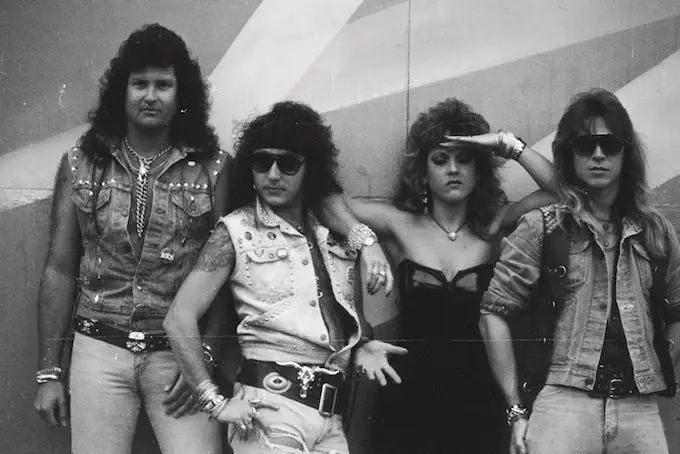
Andrew:
Walk me through the formation, and early days of Bitch. What can you recount regarding the band’s first gig?
Betsy:
Original guitarist and drummer David Carruth and Robby Settles, respectively, moved to L.A. from Texas and wanted to form a hard rock/metal band. They didn’t necessarily have a female singer in mind when they generated the idea of forming this band, but I answered an ad they placed in a music trade paper. They loved the sound of my voice, and thought it would fit perfectly with the music they had in mind, and it was then, and there that they decided on a female vocalist.
Our first gig was at midnight on a Sunday at The Troubadour in West Hollywood; Dante Fox opened up for us, who would later go on to become Great White. The audience attendance was decent and we put on a great show, I remember consciously realizing when I was onstage that we really had something cool going. I have the show on VHS format, maybe one day to be converted.
Andrew:
Bitch is well known as the very first act to sign with Metal Blade Records. What do you recall regarding your first interactions with Brian Slagel?
Betsy:
Brian was a very close friend and fan before he signed us to Metal Blade. He was good friends with the whole band and was part of our entourage when we’d go to parties or clubs, or just hang out at each other’s houses. He put Bitch on the very first Metal Massacre album when he was still running Metal Blade Records out of his mom’s garage in Woodland Hills. His label startup and the formation of Bitch were timed perfectly, and after Metal Massacre, Bitch was Metal Blade’s first band signing. The EP Damnation Alley first, followed by the LP Be My Slave.
Andrew:
Bitch’s inclusion on the Metal Massacre cassette proved imperative to the band’s trajectory. What do you recall regarding the recording of “Live for the Whip?”
Betsy:
It was probably my first experience in a recording studio and I was fascinated by the way the tracks were all recorded individually, laid down, and mixed together to form the finished product. I recall doing very well in the studio; I believe we got the final vocals tracked in only a few takes.

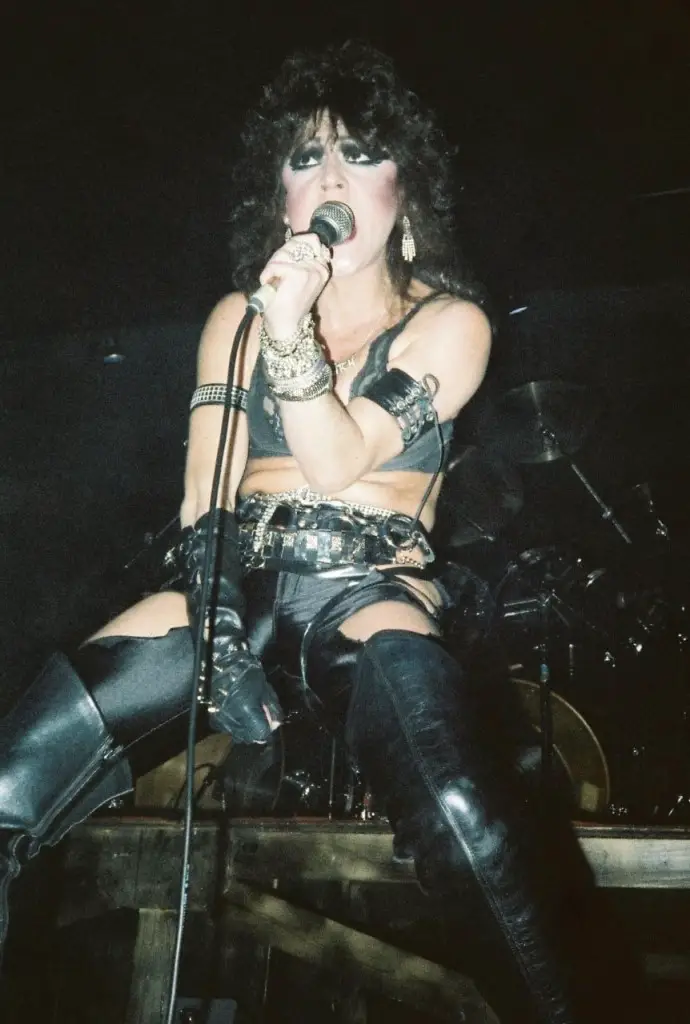
Andrew:
How critical was Metal Blade in getting Damnation Alley its greater release?
Betsy:
It was our first release, and to have exposure nationally, and internationally due to being signed to Metal Blade was great. It was huge because it got us more notoriety than just being a local L.A. band, and having limited exposure. It got our music out worldwide and reached a wider audience.
Andrew:
Bitch’s debut Be My Slave is a beloved classic. I know this is going back, but if you can, walk me through the album’s genesis, and recording.
Betsy:
We wrote songs until we had enough good ones for a full album, then went for it. We knew we had a good vehicle with which to get it released and promoted, that being Metal Blade Records. I do remember we had a limited amount of time, and limited budget due to the early stages Metal Blade was in at the time, so we kind of hurried through it. When I listen back to it, I can sort of hear that, but I get a lot of great feedback from fans about how that album got them hooked on metal music, and on Bitch.
Andrew:
On tour, Bitch honed its elaborate stage show and became a regular on the Sunset Strip. What memories do you have of the band’s early days on the road?
Betsy:
We’ve actually been more on the road these days than back then. In the early days, we’d go out of town to play frequently, but never on an extended tour. We definitely had some memorable early out-of-town gigs though; Metallica opened for us at The Stone in San Francisco in ’82 or ’83, and we played a great show in a huge auditorium in Northern California with Slayer. Other than that, we played live shows quite frequently in L.A., many times with Metal Blade bands such as Lizzy Borden, Armored Saint, etc. We played at The Troubadour with W.A.S.P. quite a bit. The bookers of that club thought we were a good double bill, and booked us together frequently.
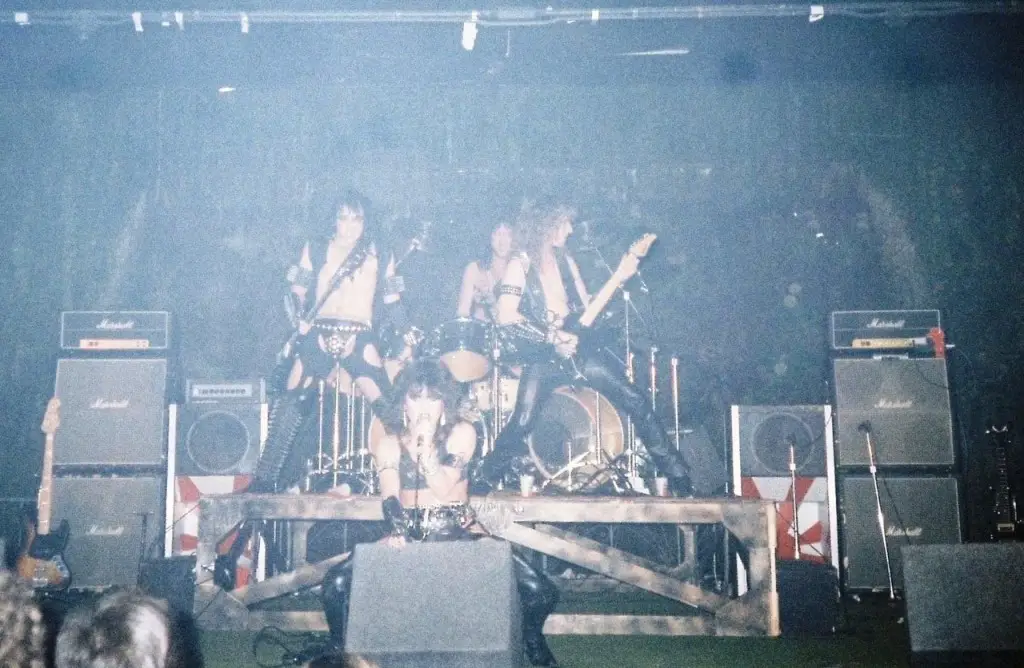
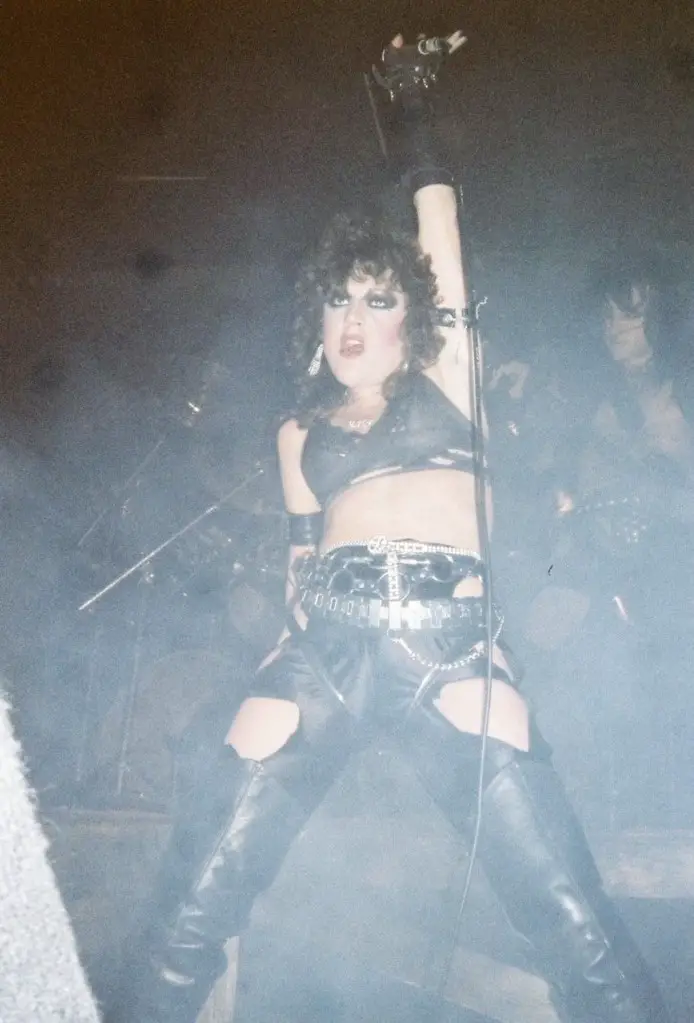
Andrew:
How did you go about developing the stage show which you would become known for? Who were your biggest influences in that regard?
Betsy:
My most significant performance inspiration was Alice Cooper and his theatrics, and actually still is to this day. I knew I wanted to give the audience a visual and some kick-ass music that went along with it. When we started writing songs like “Live For The Whip,” and “Be My Slave,” the S&M image just kind of developed along with that.
Andrew:
The mid-80s proved difficult for Bitch in drawing the ire of many activist groups who opposed your stage show. Paint a picture of the challenges you faced, and how you dealt with that adversity.
Betsy:
It never really set me back. I actually enjoyed the extra publicity, especially when Tipper Gore of The PMRC would tote “Be My Slave” where ever she went to speak on behalf of her organization. I have a photo of her holding it up. The only challenge that comes to mind off-hand is that some people didn’t really take me seriously as a musician at first, they thought I was just some chick wearing skimpy outfits on stage and promoting kinky sex. It took a while before our musical credibility as a band was acknowledged.
Andrew:
The Bitch is Back was a stout follow-up, but it took a full four years to release. What led to the long lag between recordings, and how detrimental was that to the band’s success?
Betsy:
We got hooked up with some management that, while their intentions were good, they gave us some bad advice in terms of the hiatus we took in between releases, trying out a new band look, etc. As soon as we broke ties with them, we were able to move back into our own pace, and vision of the band. It wasn’t really detrimental because it kept people wondering when The Bitch would be back. [Laughs].
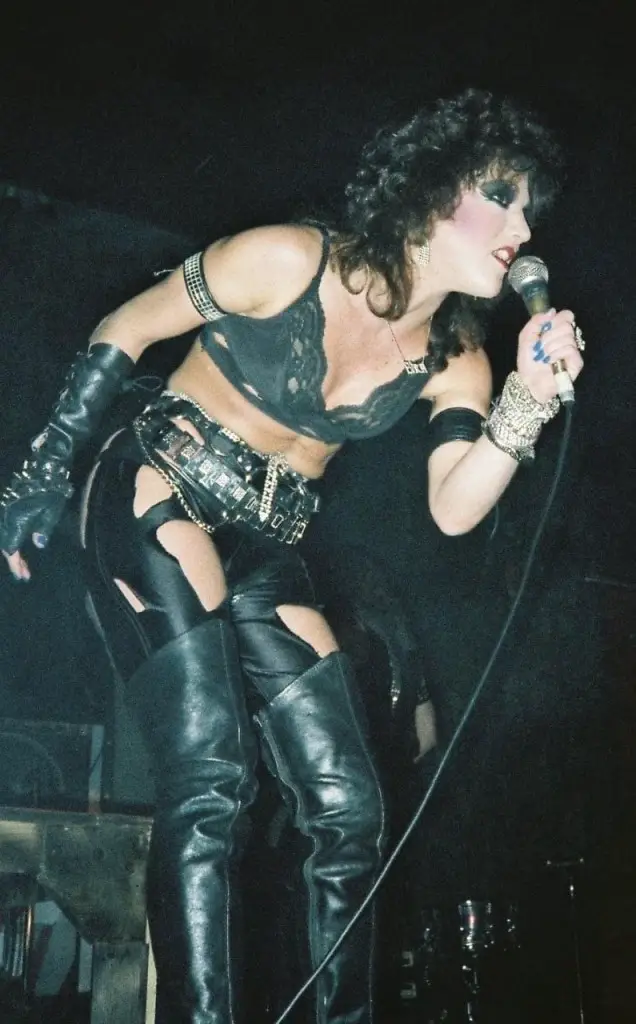
Andrew:
Bitch’s third record, Betsy, was released in 1989 and saw the band continue to move toward a more hard rock approach, rather than metal. What prompted that shift?
Betsy:
The name change to “Betsy” for the one release was experimental in terms of seeing if maybe the controversial band name “Bitch” may be holding us back commercially, which in the long run, it wasn’t, so we went back to the better band name of “Bitch.” As far as the musical content of that release, it was the first time we ever utilized outside songwriting for a few of the cuts, and we wanted to try a more melodic hard rock approach to the music. I personally really like all of the songs on that release. The production and musical execution are great.
Andrew:
I agree with your assessment of Betsy. In the years since Bitch has remained inactive as a studio outfit. Can you shed some light on why you’ve avoided recording a fourth album?
Betsy:
Well, the short answer is that we need to step up on songwriting. We’ve been playing these 80s shows, and metal festivals where the fans want to hear the old-school songs they know and love. While that’s great, that kind of impeded us a bit in terms of moving on with new songs. That said, we have been writing new material, and hope to release something in the near future.
Andrew:
In retrospect, Bitch, as a band, were outliers amongst a bustling 80s scene. You seemed to find yourself in between genres, and your aesthetic was beyond what most were doing. How do you view the band’s accomplishments in hindsight?
Betsy:
I am forever grateful that Bitch is on the heavy metal map, and to this day, the fan support and adulation take me aback. I never take for granted that we do have a certain modicum of success and notoriety, and I value that greatly, and as long as I can keep bringing it, I’m going to! My current band line-up is the best ever with Chris Cardenas on guitar, Randal West on drums, and Curt Remington on bass.
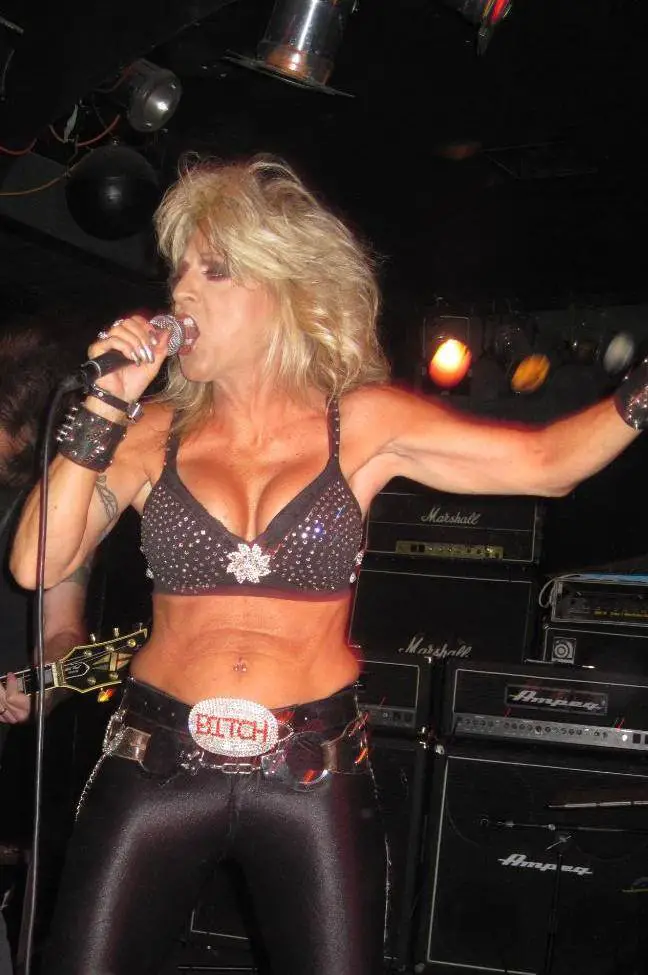
Andrew:
It’s also worth noting that you were a woman fiercely leading the charge in a male-dominated scene. Given the circumstance, how difficult did you find it to be seen and heard?
Betsy:
I have always reveled in the fact that I was and am one of the few females in “The Heavy Metal Boys Club.” I never had a problem fitting in, and I’ve always felt very accepted. And once the critics discovered that we could back the image up with the quality of music, that was even more validating.
Andrew:
Every decade has its musical heroes, and it could be said that you were a hero for many women in heavy metal and hard rock, Betsy. These days, there’s a great push to do away with terms such as “female-fronted heavy metal.” What are your thoughts on the matter?
Betsy:
First off, thank you for the “hero” status; I don’t know about that, but I have been told I’ve been inspirational, which is awesome! I have no problem with the term “female-fronted heavy metal,” whatever anybody wants to call it is fine with me.
Andrew:
Last one, Betsy. What’s next on your docket in all lanes?
Betsy:
To keep Bitch rocking as long as I possibly can. I have an amazing band currently, and we’re ready to kick ass anytime, and anywhere. As long as the fans and the support continue to prevail, that’s motivation enough for me.

Interested in learning more about Bitch? Hit the link below:
Be sure to check out the full catalog of VWMusic Interviews, by Andrew Daly, here: www.vinylwritermusic.com/interviews
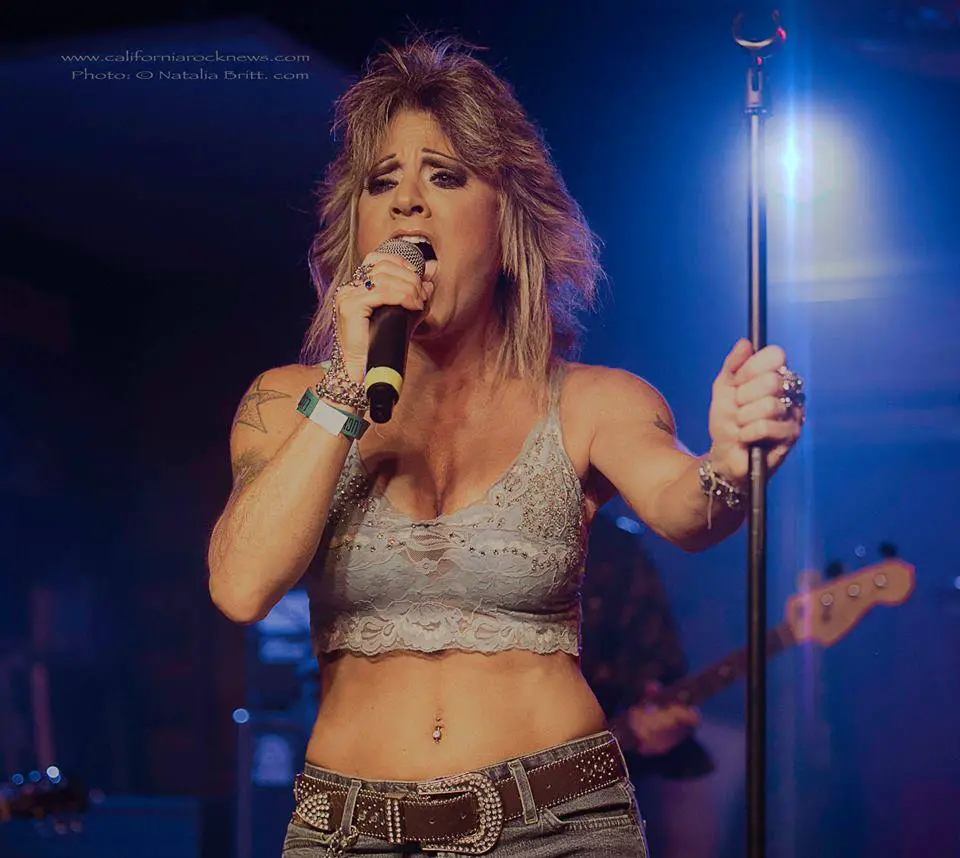




Leave a Reply